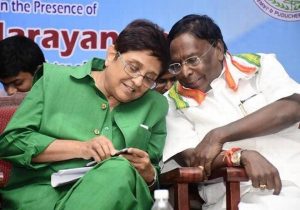
20-02-2019 (Important News Clippings)
To Download Click Here.
काहिली से उबरे भारत
रहीस सिंह

भारत और पाकिस्तान के रिश्तों की परवाह अब शायद ही किसी को रह जाए। वैसे भी पाकिस्तान तो इन रिश्तों को कब का जमींदोज कर चुका है, अब भारत को भी इस पर विराम लगा देना चाहिए। हालांकि राजनीति या कूटनीति ऐसी चीज है कि वहां स्थायी कुछ नहीं होता बल्कि वहां बहुत कुछ अप्रत्याशित होता है, खासकर तब और जब अनावश्यक रूप से लोकप्रियता को तरजीह दी जाए। लेकिन यहां सवाल यह है कि पाकिस्तान की तरफ से जो इस तरह के अमानवीय कृत्य निरंतर किए जा रहे हैं, वे उसकी कायरता का प्रतीक हैं या रणनीति का हिस्सा? क्या भारत इसी तरह से दु:ख, आंसू और क्षोभ व्यक्त करेगा या भारत का एक पढ़ा-लिखा तबका ‘‘वी वांट जस्टिस’ लिखी हुई काली पट्टी सोशल मीडिया पर चस्पा कर इंसाफ प्राप्त करने करने भाव प्रदर्शित कर जस्टिस हासिल कर लेगा या फिर भारत एक निर्णायक लड़ाई पाकिस्तान प्रायोजित आतंकवाद के खिलाफ शुरू कर वास्तव में इंसाफ देगा?
इस प्रश्न पर भी विचार करना होगा कि पुलवामा में जिस तरह से जैश-ए-मुहम्मद ने हमले को अंजाम दिया या इससे पहले उरी और पठान की घटनाएं हुई थीं, वे भारत को आंतरिक और बाहरी सुरक्षा के मामले में कमजोर एवं शिथिल पड़ने का संकेत तो नहीं दे रही हैं? पाकिस्तान की हरकतें बाहुबल की श्रेणी में भले ही न आती हों लेकिन कायरता मानना उचित नहीं लगता। पिछले तीन दशकों से वह इसी रणनीति पर आगे बढ़ते हुए भारत को बड़ी मानवीय व आर्थिक क्षति पहुंचा चुका है। इसलिए अब हमें गम्भीरता से इस प्रश्न पर विचार करना होगा कि क्या हम वास्तव में पाकिस्तान स्थित आतंकी संगठनों के खिलाफ कोई निर्णायक कार्रवाई करने की मन:स्थिति में हैं या उस स्तर की रणनीति हमने तैयार कर ली है जैसी अमेरिका ने ओसामा बिन लादेन के खिलाफ ऐबटाबाद में अपनायी थी? क्या भारत,चीन,अमेरिका और रूस को पाकिस्तानी आतंकवाद के खिलाफ संघर्ष के लिए तैयार कर पाएगा? प्रधानमंत्री नरेन्द्र मोदी ने चीन को खुश करने का कोई अवसर नहीं छोड़ा लेकिन वह पाकिस्तान के मामले में टस से मस नहीं हुआ।
पुलवामा घटना को लेकर चीन की सरकारी मीडिया ने न कोई खबर छापी और न ही निंदा की। नियंत्रण स्तर पर भी इस घटना की वैसी निंदा नहीं हुई जैसी कि होनी चाहिए थी। तो फिर क्या माना जाए? ऐसी स्थिति में एक प्रश्न यह भी उठता है कि चीन को अपने खेमे में लाए बगैर पाकिस्तान के खिलाफ क्या निर्णायक कार्रवाई की जा सकती है? पाकिस्तान का ऑल वेदर फ्रेंड चीन प्रत्येक फोरम पर पाकिस्तान के साथ खड़ा रहता है। यही नहीं, उसने संयुक्त राष्ट्र सुरक्षा परिषद में मसूद अजहर को आतंकी के खिलाफ लाए गये प्रस्ताव पर वीटो तक कर दिया। ध्यान रहे कि जैश-ए-मुहम्मद की आतंकी गतिविधियों और पठानकोट हमले में अजहर मसूद की भूमिका से जुड़े सबूत देने के साथ भारत की तरफ से उसके खिलाफ लाए गये प्रस्ताव पर चीन ने वीटो किया था। भारत ने यह भी कहा था कि वर्ष 2001 से जैश सुरक्षा परिषद की प्रतिबंधित सूची में शामिल है क्योंकि वह आतंकी संगठन है और उसके अल-कायदा से लिंक हैं, लेकिन तकनीकी कारणों से जैश के मुखिया अजहर मसूद पर प्रतिबंध नहीं लगाया जा सका। खास बात यह है कि भारत के तर्क से सुरक्षा परिषद के 15 में से 14 सदस्य सहमत भी थे, लेकिन चीन ने वीटो कर दिया। उस समय चीनी विदेश मंत्रालय की तरफ से तर्क दिया गया था कि चीन ‘‘आतंकवाद के खिलाफ अंतरराष्ट्रीय सहयोग में संयुक्त राष्ट्र में एक केन्द्रीय एवं समन्वित भूमिका निभाने का समर्थन करता है। लेकिन ‘‘हम एक वस्तुनिष्ट और सही तरीके से तयों और कार्यवाही के महत्त्वपूर्ण नियमों पर आधारित सुरक्षा परिषद समिति के तहत मुद्दे सूचीबद्ध करने पर ध्यान देते हैं जिसकी स्थापना प्रस्ताव 1267 के तहत की गयी थी।’ कमाल है रूस, फ्रांस, ब्रिटेन और अमेरिका को यह वस्तुनिष्ठता नहीं दिखी, सिर्फ चीन को दिखी।
उसकी वस्तुनिष्ठता चाइना पाकिस्तान इकोनॉमिक कॉरिडोर अथवा अन्य प्रकार के गठजोड़ों से निर्देशित है, जो फिलहाल प्रो-पाकिस्तान बनी रहेगी। चीन इससे पहले 26/11 के मास्टर माइंड जकीउर रहमान लखवी के मामले में भी संयुक्त राष्ट्र सुरक्षा परिषद में वीटो कर चुका है। मतलब साफ है कि चीन आतंकवाद (विशेषकर पाकिस्तान द्वारा पोषित एवं संचालित आतंकवाद) को लेकर चाहे जितना सिद्धांतवादी बने, लेकिन वह संयुक्त राष्ट्र के प्रस्तावों (विशेषकर प्रस्ताव संख्या 1267) को अपनी वीटो ताकत के जरिए कमजोर कर रहा है और आतंकवाद को पोषण दे रहा है। वह यह भी भूल जा रहा है कि यह अंतत: उसके लिए भी खतरनाक साबित होगा क्योंकि उइगर मुसलमानों में चीन की सरकारी नीतियों के प्रति जिस तरह का असंतोष है, उससे शिनजियांग प्रांत बर्निंग स्टेज पर है और चीन यह अच्छी तरह से जानता है कि उइगर विद्रोहियों के रिश्ते पाकिस्तान आधारित आतंकवादी संगठनों से हैं। इसके बावजूद आज उसे अपने आर्थिक एवं साम्राज्यिक हित पाकिस्तान में दिख रहे हैं इसलिए वह पाक आतंकवादियों को संरक्षण प्रदान कर रहा है।
भारत के सामने अब दो विकल्प हैं। प्रथम यह कि वह नियंत्रण जनमत को अपने पक्ष में और पाकिस्तान के खिलाफ बनाकर ‘‘वार इन्ड्यूरिंग फ्रीडम’ जैसी लड़ाई शुरू करे। दूसरा, वह पाकिस्तान के साथ की गयी उन संधियों को निरस्त कर जो पाकिस्तान के आर्थिक हितों को पोषित करती हैं, एक ‘‘सॉफ्ट वार’ आरम्भ करे। पहली लड़ाई के लिए जनमत तैयार करना मुश्किल है। इसलिए दूसरा विकल्प ही भारत को चुनना चाहिए। जब अमेरिका अपनी संधियों से पीछे हट सकता है तो फिर भारत क्यों नहीं? सही होगा कि सिंधु जल संधि को तोड़ दिया जाए तभी हम सही अर्थों में पाकिस्तान को उचित जवाब दे पाएंगे और उसके उन रिटार्यड व सेवारत जनरलों की उस मानसिकता की गाल पर थप्पड़ लगा पाएंगे जो पुलवामा पर वीडियो वायरल कर यह संदेश प्रसारित कर रहे हैं कि जम्मू-कश्मीर में आत्मघाती हमलों का दौर अब होना शुरू हो गया है। बहरहाल अब देखना यह है कि हमारा नेतृत्व अभी भी लोकप्रियता की राजनीति के उपादान खोजेगा या फिर ठोस कार्रवाई की रणनीति को अपने अंजाम तक पहुंचाएगा? उचित होगा कि भारत अपनी परम्परावादी लीक को छोड़ने का साहस जुटाए।
Discord in Puducherry
The CM’s protest against the L-G raises key issues that must be resolved early
Editorial

This round of conflict between Puducherry Chief Minister V. Narayanasamy and Lt. Governor Kiran Bedi has been more serious than those in the past. Mr. Narayanasamy sat in protest for six days, before the two could meet to hold talks to resolve a set of issues he raised in a letter earlier this month. He has been opposing what he calls Ms. Bedi’s “high-handedness” and tendency to interfere in the administration. The two have had differences on many issues over the last two years. Such problems are an obvious consequence of the political structure of Union Territories, in which the Administrator, as the nominee of the President, enjoys powers superior to the Chief Minister and the Council of Ministers. The trigger for the latest stand-off seems to have been Ms. Bedi’s move to enforce the rule for two-wheeler riders to wear helmets. While the Chief Minister believes it can be enforced only after raising awareness, Ms. Bedi wants it implemented immediately. However, the Chief Minister insists that his protest has nothing to do with this.
He lists the blocking of welfare schemes such as the free rice scheme and enhanced scholarship for Scheduled Caste students, among other actions of the L-G, as the real issues. Whatever be the origin of this conflict, the sight of a Chief Minister on an indefinite dharna is not seemly. It could not have gone on indefinitely, and the fact that a dialogue was formally initiated, albeit after much delay, is a welcome development. Central to the conflict is the question whether Ms. Bedi is acting within her powers or exceeding her brief in seeking to play a proactive role in the affairs of the Union Territory. Under the Constitution, the territory belongs to the President, who runs it through the L-G as Administrator. However, under Section 44 of the Union Territories Act, 1963, the Administrator has to act on the ‘aid and advice’ of the Council of Ministers. At the same time, any difference of opinion between them can be referred to the President, and in the meantime the Administrator’s action prevails on any urgent matter. This scheme, which gives a clear edge to the Centre, can work only if there is harmony between the Council and the L-G. It would be unfortunate if individuals occupying Raj Nivas in any Union Territory with a Legislative Assembly get carried away and ignore or undermine the elected body. Last year, ruling on the limits of the L-G’s powers in Delhi, the Supreme Court stressed the need for the L-G as well as people’s representatives to “function in harmony within constitutional parameters”. The L-G was cautioned against having a hostile attitude towards the Ministers. There is no reason why that principle cannot be extended to Puducherry, which has a longer record of elected governments.
Who Rules?
Kiran Bedi’s face-off with Chief Minister Narayanasamy in Puducherry raises questions about role of Lt Governor in Union Territories
Editorial
The unseemly confrontation between Lieutenant Governor Kiran Bedi and Chief Minister V Narayanasamy in Puducherry raises serious questions about the remit of the LG’s office in this Union Territory with an elected government. Narayanasamy is sitting on a dharna outside the Raj Bhavan since February 13 demanding that the LG approve his cabinet’s proposals concerning social welfare schemes and other governance matters. Bedi, who left Puducherry for Delhi a day after the dharna began, cut short her visit and returned to the state capital on Sunday.
Both parties have preferred to engage through open letters, public statements and social media barbs instead of sitting across the table and sorting out their differences. Delhi Chief Minister Arvind Kejriwal and his deputy, Manish Sisodia, visited Narayanasamy on Monday to express solidarity and to highlight what they see as an attempt by the Centre to usurp the powers of elected governments through the LG’s office. In Delhi, a combative government has taken its disputes with the LG to the Supreme Court. Though the issues in Delhi and Puducherry seem similar, the LG of the National Capital Territory has more executive powers compared to his counterpart in the southern UT. This is understandable since Delhi is also the home of the Union government.
The Government of Union Territories Act, 1963 allows the office discretionary powers, but these must be exercised judiciously and only in exceptional circumstances. Puducherry has an elected assembly and the task of law making should be entrusted with it. Similarly, public policy and administration must be left to the elected representatives. Bedi has chosen to ignore this simple principle and is insisting that the elected government function under her direction. For instance, among the proposals Bedi has refused to approve are a government initiative for free rice — the LG has mooted cash transfers, instead — and salaries for teachers in aided institutions.
The LG may disagree with these, but should she stall them, especially since some of these proposals were a part of the ruling party’s election manifesto and are within the ambit of law? The UT Act was legislated more than half a century ago. Much has changed in UTs like Delhi and Puducherry, which have legislative assemblies. The office and role of the LG needs to be restructured to recognise the shift in public sentiment towards more democracy. Clearly, there is a need to reimagine the political system in the UTs in favour of the popular government.
